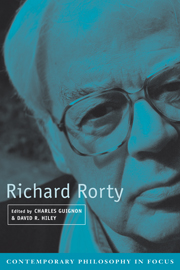Book contents
- Frontmatter
- Contents
- Contributors
- Acknowledgments
- Abbreviations
- Richard Rorty
- 1 Introduction: Richard Rorty and Contemporary Philosophy
- 2 Rorty's Critique of Epistemology
- 3 Rorty on Knowledge and Truth
- 4 From Realism or Antirealism to Science as Solidarity
- 5 Rorty's Democratic Hermeneutics
- 6 Rorty's Inspirational Liberalism
- 7 Don't Be Cruel: Reflections on Rortyan Liberalism
- 8 Rorty and Philosophy
- Bibliography
- Index
8 - Rorty and Philosophy
Published online by Cambridge University Press: 18 December 2009
- Frontmatter
- Contents
- Contributors
- Acknowledgments
- Abbreviations
- Richard Rorty
- 1 Introduction: Richard Rorty and Contemporary Philosophy
- 2 Rorty's Critique of Epistemology
- 3 Rorty on Knowledge and Truth
- 4 From Realism or Antirealism to Science as Solidarity
- 5 Rorty's Democratic Hermeneutics
- 6 Rorty's Inspirational Liberalism
- 7 Don't Be Cruel: Reflections on Rortyan Liberalism
- 8 Rorty and Philosophy
- Bibliography
- Index
Summary
Rorty has a distinctive stance in the contemporary philosophical world. It is one that is often described as “antirealist,” “relativist,” “subjectivist,” including by myself. But Rorty repudiates such labels. His point rather is that we should get away from a number of philosophical dichotomies that have supposedly outlived their usefulness; we should learn that we can lay them to rest, that they add nothing of value to our thought. Somewhat overmodestly describing himself with the Lockean term “underlaborer,” he sees himself as “clean[ing] up and dispos[ing] of what [great] imaginative pioneers [e.g., Frege and Mill, Russell and Heidegger, Dewey and Habermas, Davidson and Derrida] have shown to be rubbish” (TP 8).
Now Rorty and I have an old debate going. This is the nth round; I have lost count. But what seems constant throughout is an agreed-upon basis – that we both see ourselves as getting out from under the Cartesian, representational epistemology – and within this a difference. This latter might be put in the following way: that for Rorty we escape from “the collapsed circus tent of epistemology – those acres of canvas under which many of our colleagues still thrash aimlessly about” (TP, 93), mainly by getting rid of certain traditional distinctions and questions: for example, the scheme–content way of talking or the issue of correspondence with reality; while I think that these distinctions and questions have to be recast.
- Type
- Chapter
- Information
- Richard Rorty , pp. 158 - 180Publisher: Cambridge University PressPrint publication year: 2003
- 21
- Cited by

